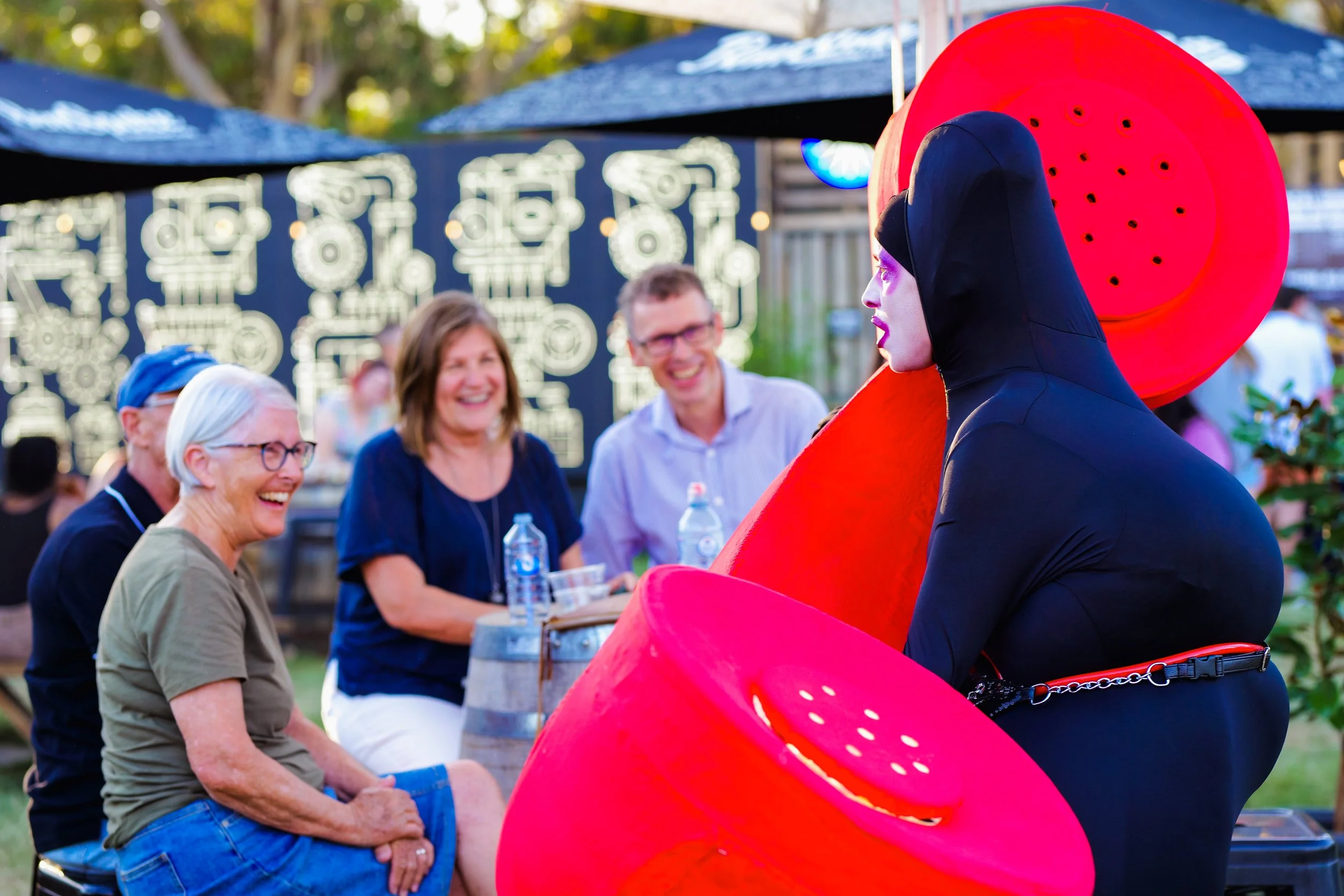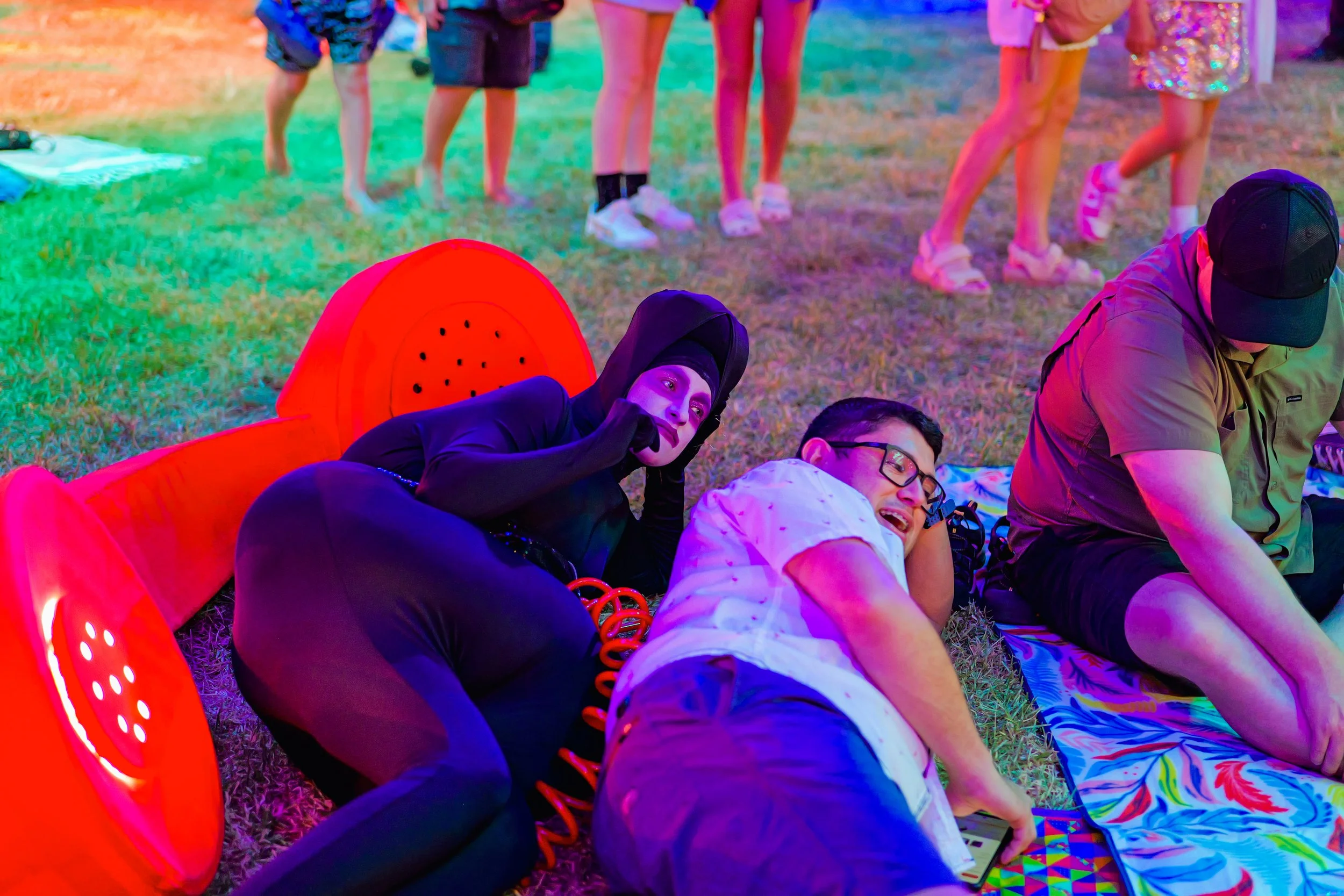Audience interaction & consent
This month in the Fool’s Playground we dove headfirst into the messy, delicious business of audience interaction and consent.
It’s one thing to make a room laugh. It’s another to stand there, vulnerable and ridiculous, and say to the audience: “Will you play with me?” That was our focus - not forcing, not begging, but discovering the complicité that happens when a crowd chooses to fall with you.
We began with vows
We started with a journal writing exercise. The prompt: If the audience were getting married, what vows would you make to them?
The vows that emerged were absurd, poetic, and beautifully inappropriate:
“I vow to lead everyone in a mass conga line.”
“I vow to give you a truly squishy experience.”
“I vow to literally make love to you.”
These clown-vows cracked us open. They reminded us that the audience isn’t an abstract “crowd” but a partner - fragile, funny, holy, and human.
The manifesto
Later, I pulled together what we were discovering into a kind of manifesto - part sacred text, part nonsense guide, part survival kit. Rules like:
Consent is the first joke.
If the volunteer fails, it’s your fault. Applaud louder.
When they laugh, don’t chase it. Inhale. Pause. Exhale.
The laugh is a guest, not a trophy.
Naturally, the clowns broke the rules immediately. That’s how you know they were alive.
Exercises that opened doors
Baby Breath
In pairs, one clown edged forward only when their “audience” laughed. A giggle meant a small step, a guffaw meant a leap. Add gibberish, rhythm, tempo changes. The work here was listening with the whole body, distinguishing between polite smiles and genuine laughter, and learning how to release the pressure valve when tension built.
Yes / No Game
The clown makes an offer: “Should I dance?” “Do you like me?” The audience answers yes or no. The clown obeys, resists, or misinterprets. Suddenly “no” isn’t rejection but raw material. The audience literally co-authors the game.
Borrowed Object
The clown asks for something - a scarf, a phone, a hat. Only if it’s freely given can the game begin. Once offered, the object becomes absurdly precious. If nothing is offered, that too is material. The game is trust itself.
The Chair Invitation
An empty chair, a chosen spectator, a bubble of complicité. The clown serenades, flatters, flails. The spectator may or may not respond, but their presence alone becomes the anchor. The art is sensitivity - how to make someone shine without making them uncomfortable.
Complicité: Why this is the first lesson
In Lecoq’s pedagogy, the first step of clowning is complicité - the invisible thread of connection between performer and audience. Without it, you’re doing tricks at people. With it, you’re breathing together, complicit in each other’s stupidity.
Complicité isn’t about control. It’s about shared risk. The clown proposes, the audience disposes. A “no” doesn’t kill the game - it births a new one. Refusal becomes material.
This is why consent is so central to clowning. Consent builds complicité. To force an audience is to break it. To listen to them, even when they say “no”, is to create trust. And trust is the soil where play grows.
Free exercise to try: Yes / No
You can play this one in your own group, drama class, or rehearsal room. It’s simple, but it goes straight to the heart of audience relationship.
Step 1: One person is the clown, the rest are the audience.
Step 2: The clown makes an offer: “Shall we dance?” “Can I sit here?” (or something silent, like holding out a hand).
Step 3: The audience answers: yes or no. Honestly. Without acting.
Step 4: The clown plays with it:
Yes = escalate, celebrate, commit.
No = embrace rejection. Make it funny, tragic, poetic.
Step 5: Switch roles. Debrief: What worked? Did refusal create laughter? When did you feel complicité alive in the room?
Why it matters
For performers, this work sharpens timing, trust, and generosity. For humans, it’s practice in listening, consent, and letting go of control.
Clowning is about complicity. About giving the audience dignity, choice, and the pleasure of play.
The audience is never yours. They are a miracle. And if they give themselves to you, even for a moment - it’s sacred.
The Fool’s Playground will be back next month with a new theme (and yes, new disasters). If you’ve been hovering at the edges, wondering if it’s for you, it is. The audience is waiting.
xx
Leash



